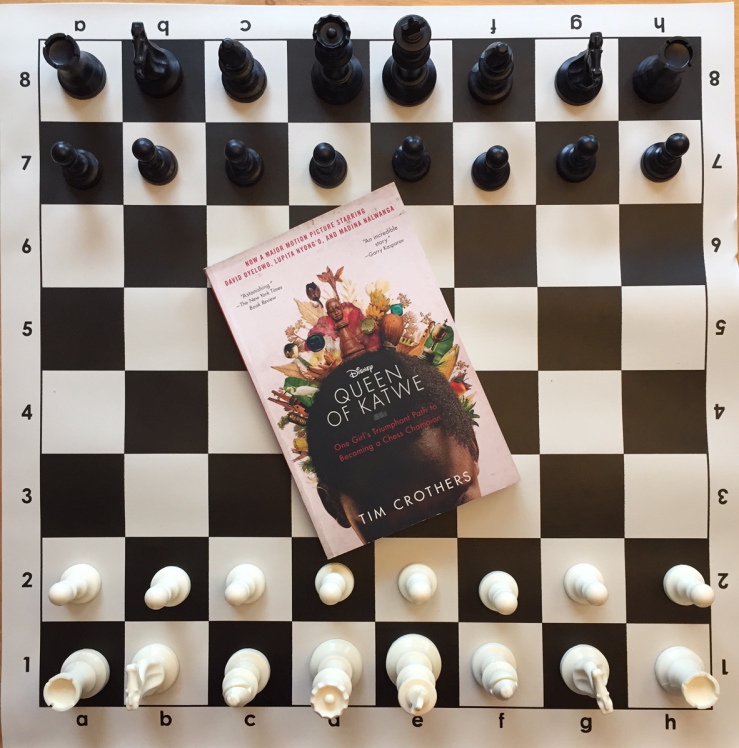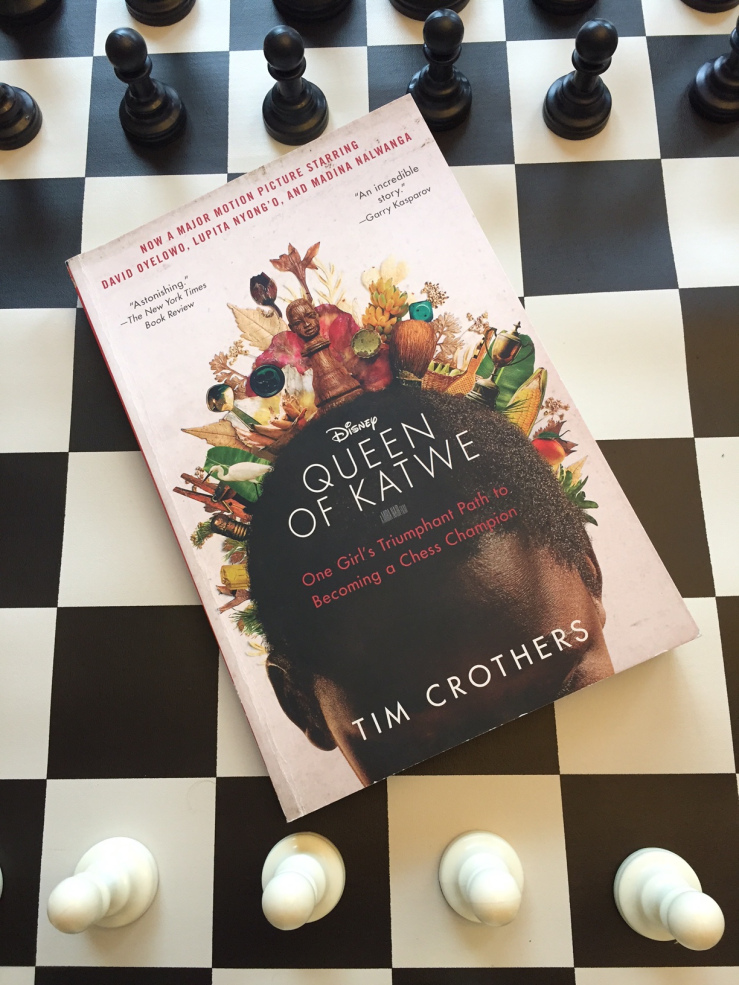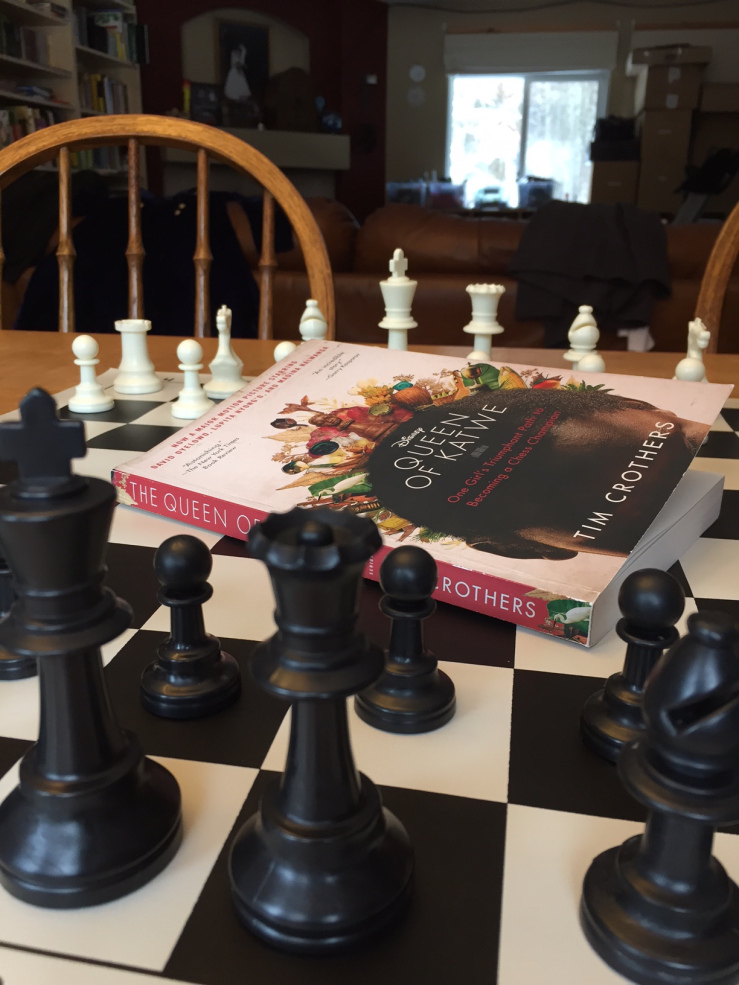Queen of Katwe, is the amazing story of Phiona Mutesi, a young woman from Uganda, who against all odds may have found a way out of the Katwe slum through the most unlikely of avenues: CHESS. Under the tutelage of Robert Katende, himself a former resident of the slums and a war refugee, Phiona is now the first titled Chess player in Uganda’s history, and has dreams of not only becoming a Chess Grandmaster, but also of returning to the slums as a pediatrician.
 Queen of Katwe
Discussion:
Queen of Katwe
Discussion:
Falling in love with Phiona Mutesi’s unique story of triumph over adversity was easy; it was as motivating and inspirational, as it was heartbreakingly realistic. However, I must admit that I found the book in which her story was delivered to be a bit more of an acquired taste, and while I did eventually come to truly enjoy this book, it did take me a while to settle into it. This had mainly to do with how the book was organized. Rather than presenting Phiona’s story as one flowing narrative, or even as a collection of first person accounts relaying her story, Crothers instead presents a series of short biographies and vignettes, that while fascinating in their own right, did feel somewhat random and unrelated at first. Often times, it would not be until midway through a chapter before it became evident how this person’s story was in any way related to Phiona’s.
However, as I read through the pages describing the experiences and hardships of those people whose lives have intersected with Phiona’s, I began to see not only how the pieces fit together as a whole, but to appreciate what I had initially seen as a short coming. By sharing the personal accounts of a handful of people, the author introduces the reader not only to the remarkable story of Phiona Mutesi, but to the harsh realities of life in the slums of Uganda, and the seeming hopelessness that seems to pervade every aspect of it. This almost anthropological approach also allows Crothers to touch on a great deal more about Ugandan culture, history, economics, and even politics than if he had taken a more tightly focused and organized approach to presenting Phiona’s story. For example, rather than simply listing the World Health Organizations statistics of morbidity due to AIDS, war, and famine, as one might encounter on a News report or in a magazine, Crothers instead focuses on how the disease has specifically touched and affected the individuals who’s stories he is telling. And in doing so, he manages to point out that the mean age in Uganda, because of these hardships is only 14, and that many of the children in the slums are being raised by their grandparents, if by anyone at all.
Such revelations certainly serve to inform the reader just how unique Phiona’s talents are, and how unlikely they would have been to be discovered if not for the Sports Ministry work of Robert Katende. Ordinarily, I must admit I am somewhat skeptical of missionary work; too much harm been done throughout human history in the name of salvation. But it is hard to be anything other than impressed and touched by the mission work of Robert Katende, and the hope, focus, and help he has provided the children of Katwe. By offering the children of the Katwe slum a hot meal, and the idea that with hard work, discipline, and faith he exposed them to the idea that there is a way out of the slums.
 Queen of Katwe
Queen of Katwe
Initially, Katende would play soccer with the children and then teach them about the tenants of his faith. However, when he realized that a number of children were not coming because they either didn’t like sports or were afraid of getting hurt because they could not afford health care, he decided to try playing chess; a game so foreign that there is no word for it in their language.
I think it important to say, that while Phiona has been the most dramatically successful (and may even be the most talented) of the children Katende has mentored and taught, she is not the program’s only success story. Many of the other children have stayed out of trouble, stayed in school, and have dared to dream of something other than the hand to mouth survival they were born into. Some even dream of going on to university, and becoming doctors, nurses, and engineers.
This book is definitely worth the time it takes to read. I learned so much about a place and culture that I had previously known next to nothing about. But more than that, I was truly inspired and humbled not only by the story of Phiona Mutesi, but by the stories of all of the individuals shared in this book.
 Queen of Katwe
Advertisements
Share this:
Queen of Katwe
Advertisements
Share this:




